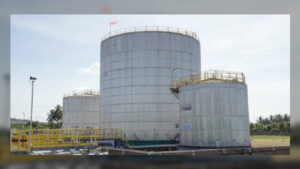
Clear rules seen needed for DoE emergency takeover of oil firms
By Sheldeen Joy Talavera, Reporter
THE Department of Energy (DoE) needs to come up with clear and specific rules outlining which occasions warrant the emergency takeover of oil companies, analysts said.
“The SC (Supreme Court) decision has sufficient bases under the constitution and relevant laws on the emergency powers of the President,” Pedro H. Maniego, Jr., senior policy advisor of the Institute for Climate and Sustainable Cities (ICSC), said in an e-mail interview.
“However, the emergency situations and times when the DoE can take over operations of oil companies must be specific and clear and within the directive issued by the President on the particular emergency,” he added.
In a statement last week, the DoE said it backed the SC ruling affirming its authority to temporarily take over the downstream oil industry in case of national emergency.
The DoE has said that is has committed to implementing Section 14 (e) of the Republic Act No. 8479 or the Downstream Oil Industry Deregulation Act of 1998 “as the public interest may require in times of national emergency.”
The commitment is “in accordance with the Constitution and the applicable laws and consistent with the President’s intent or instructions,” it said.
The provision states that “in times of national emergency, when the public interest so requires, the DoE may, during the emergency and under reasonable terms prescribed by it, temporarily take over or direct the operation of any person or entity engaged in the industry.”
“At the practical level, I believe the government’s only value-added contribution lies in facilitating access to oil supply through government-to-government agreements, similar to what was done in the 70s,” ICSC Energy Transition Advisor Alberto Dalusung III said.
Gerry C. Arances, executive director of Center for Energy, Ecology, and Development, said that the SC’s decision serves as a reminder that “ensuring the protection of public welfare is a responsibility of the government, especially during times of crisis.”
“Small public utilities group (SPUG) areas like Mindoro, Palawan, and Marinduque remain dependent on diesel for power generation, so this news is just as crucial a safeguard for power consumers in these regions as the transport sector,” he said in a Viber message.
He noted that the Energy department should ensure the resilience of the power and transport sector in emergencies “by hastening the shift to indigenous renewable energy, and by working with other government agencies to strengthen mass transportation systems.”



